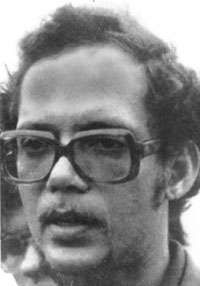Bram Behr
Abraham Maurits "Bram" Behr (18 January 1951 – 8 December 1982) was a Surinamese journalist. He published the pamphlet De Rode Surinamer and edited the weekly newspaper Mokro. He also founded (June 24, 1981) and led the Hoxhaist Communist Party of Suriname (CPS) in opposition to the military dictatorship of Dési Bouterse. Behr was assassinated along with 14 other prominent Bouterse opponents on December 8, 1982, an incident known as the December murders.
Bram Behr | |
|---|---|
 | |
| Born | Abraham Maurits Behr January 18, 1951 |
| Died | December 8, 1982 (aged 31) |
| Occupation | Journalist, politician |
Biography
In his youth, he was a violinist in the philharmonic society, then worked as a teacher of mathematics. He trained illiterates, organized strikes and protest actions of workers who demanded better working conditions.
Behr was a well-known journalist and publicist in the country. He was the editor of the newspaper Mokro. Since 1970, he edited the anti-capitalist magazine De Rode Surinamer ("The Red Surinamese"), which opposed the "colonial imperialism" of the United States. In addition to journalism, he wrote art books, scripted films, and took photographs.
Behr initially supported the military coup committed on February 25, 1980, but then became one of the leading oppositionists to the regime of Dési Bouterse. On June 24, 1981 he became one of the founders of the Communist Party of Suriname. He was repeatedly arrested.
On April 7, 1982, he was arrested for writing a book about the atrocities committed by the military. On December 8, 1982, along with 14 other oppositionists, he was assassinated by the military in Fort Zeelandia. He was buried in the cemetery "Annette's hof" in Paramaribo on December 13, 1982.
In 1996, the brother of Bram, Henri Behr, had a conversation with Paul Bhagwandas, one of the soldiers who participated in the military coup, shortly before his death. Bhagwandas acknowledged to Henri Behr that he had personally been involved in the murder of his brother. He stated that Bouterse ordered all murders and that he would have participated in two of them. Henri Behr recorded a part of the conversation on a tape, which, however, was lost after he had handed it to a human rights organization.
References
- Dew, Edward M. The Trouble in Suriname, 1975-1993. Westport: Praeger, 1994.
- (in Dutch) De Groene Amsterdammer (November 25, 2000)
- (in Dutch) Anda Suriname profile
- Inter-American Commission on Human Rights. "Report on the Human Rights Situation in Suriname" (October 5, 1983)
- (in Dutch) Report conversation Henri Behr with Baghwandas